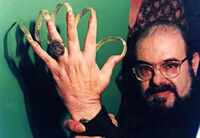| This page uses Creative Commons Licensed content from Wikipedia:José Mojica Marins (view authors). |

José Mojica Marins (Coffin Joe)
José Mojica Marins (March 13, 1936 – February 19, 2020), Brazilian filmmaker, television and media personality. Marins was also known by his created alter ego Coffin Joe.
Biography[]
Marins was born in São Paulo, Brazil at a farm in the Vila Mariana to Antonio and Carmem Marins. His interest in film-making began at an early age. When Marins was three, his father ran a local cinema, and the family lived in a flat above the theater.[1][2]
Cinema[]
See also: Film article index, Filmography
Marins became interested in cinema at a young age. He recounts that O Juzio Final (Judgement Day, 1948), filmed in 8 mm film, was his first film which he made as a teenager. He followed that film with Encruzilhada da Perdição (Crossroads to Perdition, 1952)
Marins is noted for his low budget film style, and often used friends and amateur actors to portray characters and function as crew, and his films are generally set in São Paulo, Brazil.
Although Marins is known primarily as a horror film director, his earlier works were westerns, dramas, and adventure films. In the 1980's he became a prolific exploitation film director, including films in the pornochanchada genre, which were a type of sex-comedy popular in Brazil at that time.
"Coffin Joe"[]
Main article: Coffin Joe: The character
Coffin Joe is the English equivalent of Zé do Caixão. Marins created the character in 1963 for the film At Midnight I'll Take Your Soul. The character went on to appear in many more films and as the character gained popularity he has portrayed and used the Coffin Joe persona in television programs, songs, videos, and comic books.
Coffin Joe wears a black suit, a cape and a top hat. His most notable feature is his grotesque, long, curled fingernails. Marins grew his fingernails several inches long, always wearing them in public in the style of the character. Coffin Joe is an evil, amoral character who considers himself superior to others and exploits them to suit his purposes. He hates morality and religion to the point of obsession. Coffin Joe's argument is that (self) imposed religious limitations tend to prevent individual development and, as a consequence, inhibit social change and improvement. The primary theme of the character is his single-minded obsession with the "continuity of the blood"; he wants to sire the superior child from the perfect woman. His idea of a "perfect woman" is not exactly physical but someone he regards as more courageous and intellectually superior to the Brazilian average, and in this quest he is willing to kill anyone who crosses his path.
Television[]
Main article: Television

The Strange World of Coffin Joe television program.
Marins currently hosts a monthly interview program The Strange World of Coffin Joe (Television program) (O Estranho Mundo de Zé do Caixão) on the Brazilian television station Canal Brasil, which he hosts and discusses Brazilian media and culture with other contemporary figures such as actors and musicians. His guests have included Zé Ramalho, NX Zero, and Supla. The programs are viewable on the show's website.[3]
1967-88 Marins hosted the program Beyond, Much Beyond the Beyond (Além, Muito Além do Além) Fridays on TV Bandeirantes Channel 13, with Marins embodying the Coffin Joe character presenting short horror tales written by author and screenwriter Rubens Lucchetti. Some scripts were later adapted as Coffin Joe comic books. The show's tapes were reused and currently there are no intact recordings of this program.[4]
Marins directed and hosted The Show from the Other World (Um Show do Outro Mundo) on Rede Record de Televisão, Channel 7, presented on Saturdays from 11 pm to 1 am, with Mojica personifying Coffin Joe. The program featured several horror short-films during the half-hour program, with many of the stories sent in by the viewers themselves and adapted by members of Marins' production team. The original tapes were reused and there is no record of this material.[5]
In 1996 Marins hosted the daily television program Cine Trash on TV Bandeirantes, which featured full-length horror films introduced by Marins.[6]
Documentaries[]
See: Documentaries
Universe of Mojica Marins (1978) (O Universo de Jose Mojica Marins) is a 26-minute documentary film by Ivan Cardoso. Marins portrays himself in the film which also features interviews with Marins' mother Carmem Marins, film editor Nilcemar Leyart, and Satã (Marins' assistant and bodyguard).
A 2001 documentary film, Damned - The Strange World of José Mojica Marins (Maldito - O Estranho Mundo de José Mojica Marins), by biographers André Barcinski and Ivan Finotti examines Marins' life and his works. The documentary won the special jury prize at the 2001 Sundance Film Festival.
In 1987 Marins released the semi-autobiographical documentary film Demons and Wonders (Demônios e Maravilhas), in which Marins appears as himself re-enacting moments from his life, both good and bad. Marins' family and associates play themselves, including his mother Carmem Marins, former wife and film editor Nilcemar Leyart, and Satã, Marins' long-time assistant and bodyguard.
Death[]
Marins died of bronchopneumonia on February 19, 2020, aged 83, in São Paulo.[7]
Cultural references[]

Raymond Castile in The Blind Date of Coffin Joe
- Raymond Castile's independent short film, The Blind Date of Coffin Joe parodies the character in a modern setting.
- The Brazilian band Os Mutantes mentions Zé do Caixão in the lyrics to their song "Trem Fantasma" on their 1968 self-titled debut album.
- The death metal band Necrophagia dedicates a song to the character on their album The Divine Act of Torture. The song re-tells At Midnight I'll Take Your Soul and contains sound samples of Coffin Joe's voice.
- The drummer of The Horrors has the stage name of Coffin Joe.
- Zé do Caixão is mentioned amongst two other Brazilian legends, Zumbi and Lampião, in the song Ratamahatta, from Sepultura's 1996 album Roots. He also performed an onstage 'blessing' for the band during their Barulho Contra Fome (Noise Against Hunger) concert which was the first gig of the Against tour in 1998. The recording of this turned up as a b-side entitled Prenuncio on the Tribus E.P.
- The opening from Awakening of the Beast was sampled and used as the intro to White Zombies song "I, Zombie."
- The character of Hopey in "Wigwam Bam Part Four" of Jaime Hernandez's graphic novel Locas is shown watching [[At Midnight I'll Take Your Soul].
References[]
- ↑ Popular Cinema in Brazil Dennison, Stephanie and Shaw, Lisa, 1930-2001, Manchester University Press, 2004, pp140–141
- ↑ Jose Mojica Marins: Up-Close and Personal (interview) Rist,Peter and Donato,Totaro, Offscreen.com
- ↑ O Estranho Mundo de Zé do Caixão, Official website UOL.com
- ↑ Além, Muito Além do Além Official site, UOL.com
- ↑ Um Show do Outro Mundo Official site
- ↑ Cine Trash Official site, UOL.com, retrieved February 17, 2010
- ↑ [http://www1.folha.uol.com.br/ilustrada/2020/02/morre-o-cineasta-jose-mojica-marins-o-ze-do-caixao.shtml Morre o cineasta José Mojica Marins, o Zé do Caixão
External links[]
- Main article: Coffin Joe on the Internet